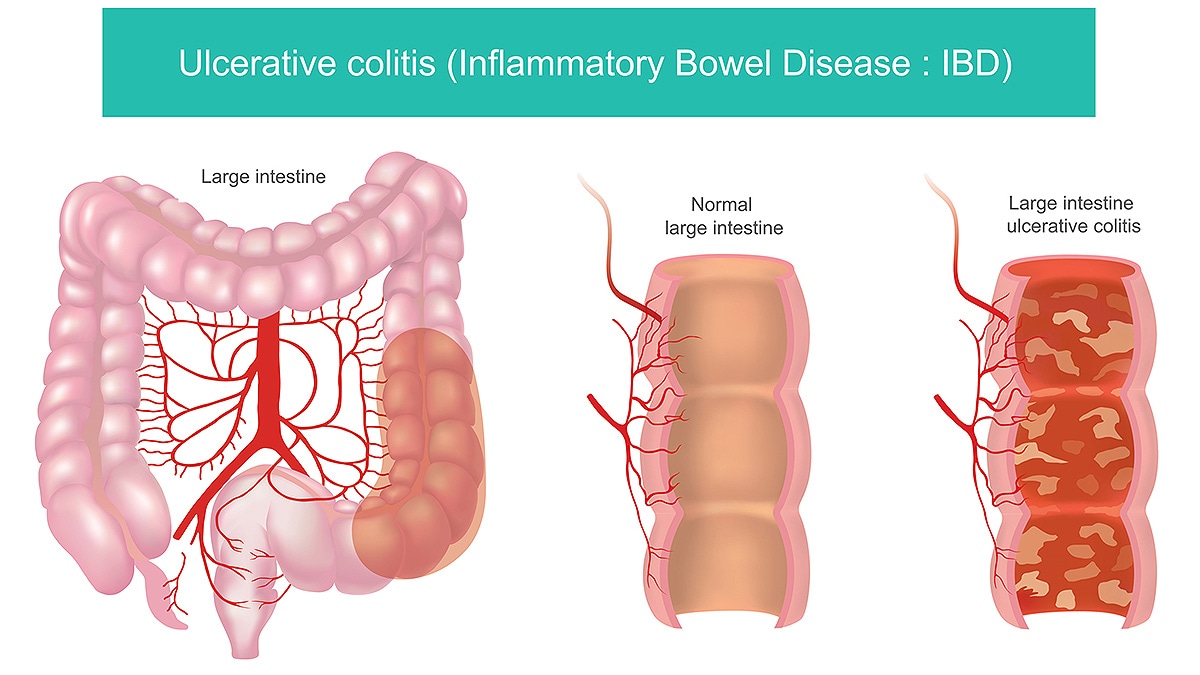What are the symptoms of ulcerative colitis?
The symptoms of ulcerative colitis can vary depending on the severity and extent of the inflammation, but common symptoms include:
- Diarrhea: Often frequent and urgent, sometimes containing blood or mucus.
- Abdominal Pain: Cramping or discomfort in the abdomen, particularly in the lower left side.
- Rectal Bleeding: Presence of blood in stools or rectal bleeding.
- Weight Loss: Unintentional weight loss due to poor nutrient absorption and decreased appetite.
- Fatigue: Feeling tired or weak due to the body’s response to inflammation and loss of nutrients.
- Fever: Low-grade fever may occur during flare-ups.
- Urgency: A frequent and urgent need to have bowel movements.
Other symptoms can include joint pain, skin rashes, and eye inflammation. The severity of these symptoms can range from mild to severe and may fluctuate with periods of exacerbation and remission.
What are the causes of ulcerative colitis?
The exact cause of ulcerative colitis is not fully understood, but several factors are believed to contribute to its development:
- Immune System Dysfunction: It is thought that an abnormal immune response triggers inflammation in the colon. The immune system may mistakenly attack the body’s own tissues.
- Genetics: A family history of ulcerative colitis or other inflammatory bowel diseases suggests a genetic predisposition. Certain genetic mutations may increase susceptibility to the condition.
- Environmental Factors: Factors such as diet, stress, and exposure to certain infections may play a role. However, these factors alone are not considered direct causes but may influence the onset or progression of the disease.
- Microbial Imbalance: Imbalances in the gut microbiota or disturbances in the normal bacteria of the intestines might contribute to inflammation.
- Hormonal Factors: Some studies suggest that hormonal changes might influence the onset or course of ulcerative colitis, particularly in women.
It is likely that ulcerative colitis results from a combination of these factors rather than a single cause. The exact interplay between these factors and how they lead to ulcerative colitis is still under investigation.
What is the treatment for ulcerative colitis?
The treatment for ulcerative colitis aims to reduce inflammation, manage symptoms, and improve quality of life. The approach can vary depending on the severity and extent of the disease and includes:
Medications:
- Anti-inflammatory Drugs: Aminosalicylates (e.g., mesalamine) help reduce inflammation in the colon.
- Corticosteroids: These drugs (e.g., prednisone) are used for short-term control of inflammation during flare-ups.
- Immunosuppressants: Medications like azathioprine or mercaptopurine can help suppress the immune system to reduce inflammation.
- Biologics: These are targeted therapies (e.g., infliximab, adalimumab) that work by blocking specific proteins involved in inflammation.
- JAK Inhibitors: Tofacitinib is an oral medication that blocks Janus kinase pathways involved in inflammation.
Surgery:
- Colectomy: In severe cases, surgical removal of the colon (colectomy) may be necessary. This can be performed as a total colectomy with ileostomy or ileal pouch-anal anastomosis (IPAA), where a new pouch is created from the small intestine to allow for normal bowel function.
Diet and Lifestyle:
- Dietary Adjustments: While no specific diet is proven to cure ulcerative colitis, managing fiber intake and avoiding foods that exacerbate symptoms can help.
- Nutritional Supplements: These may be necessary if nutrient absorption is impaired.
- Stress Management: Techniques like mindfulness and relaxation exercises can help manage stress, which may affect symptoms.
Monitoring and Follow-Up:
- Regular Check-ups: Ongoing monitoring with a healthcare provider is essential to adjust treatment plans and manage complications.
- Screening: Regular colonoscopies are recommended to monitor disease progression and screen for colon cancer.
The choice of treatment is personalized based on the individual’s condition, response to medications, and overall health.

Leave a Reply
You must be logged in to post a comment.